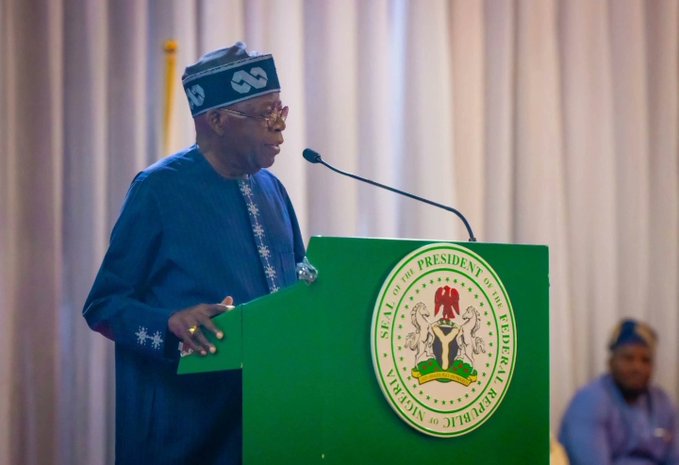President Bola Tinubu
Add a comment


The federal government has set up the National Engineering and Innovation Fund (NEIF) to support local innovation and encourage entrepreneurship.
President Bola Tinubu, represented by Bello Goronyo, minister of state for works, announced the development on Tuesday at the 2024 International Engineering Conference Exhibition and annual general meeting in Abuja.
The conference was organised by the Nigerian Society of Engineers (NSE) to address issues around sustainable engineering solutions to food security and climate change.
“I am proud to announce the establishment of the National Engineering and Innovation Fund,” Tinubu said.
“It is a new initiative designed to provide grants and resources to engineers and technologists working on solutions for Nigeria’s unique challenges.
“With this fund, we aim to support local innovations, encourage entrepreneurship, and ensure that Nigeria remains at the forefront of engineering advancement in Africa.
“It is also aimed at strengthening regulations and standards. This is because a commitment to quality and safety is at the heart of responsible engineering.”
Tinubu pledged to collaborate with the NSE and other regulatory bodies to ensure that only licensed and qualified professionals handle critical national projects.
The president encouraged engineers to explore solutions in solar, wind, and other renewable energy technologies to provide reliable, affordable, and sustainable energy.
‘NIGERIA NEEDS SUSTAINABLE STORAGE FACILITIES, PROCESSING TECHNOLOGIES’
Also speaking at the event, Abubakar Kyari, the minister of agriculture and food security, praised the NSE for its commitment to developing agriculture in Nigeria.
“Nigeria’s food security and climate resilience face pressing challenges that demand innovative and sustainable engineering solutions,” Kyari said.
“Some of these engineering tools include emerging technologies, innovative concepts, further reduction in post-harvest losses and increased usage of agricultural machinery for enhanced productivity and efficiency.”
Kyari asked engineers to design affordable and adaptable machinery for Nigerian crops and terrains to encourage mechanised farming and improve productivity.
On rural development, he called for the creation of sustainable storage facilities and processing technologies to reduce post-harvest losses, particularly in rural communities.
Kyari said renewable energy systems like solar and biogas could revolutionise agriculture in off-grid areas by providing reliable power for irrigation, processing, and storage.
The minister said the federal government is keen on supporting legislation and policies that promote sustainable engineering solutions in agriculture.
Babagana Zulum, the governor of Borno, urged the engineers to invest in research on irrigation, food cultivation, water harvesting, mechanisation, and environmental degradation to enhance food production.
“This is very important. On my part, as the governor of Borno state and one of you, we shall continue to provide the political will and the commitment needed to drive the process,” Zulum said.
Margaret Oguntala, president of the NSE, said the conference was a call for engineers to address problems and innovate solutions both for Nigeria and globally.
She said food insecurity remains a critical issue which, exacerbated by climate change, disrupts agricultural productivity and endangers livelihoods.
“As engineers, we hold the tools to pioneer sustainable solutions, whether through advancements in precision agriculture, renewable energy for rural communities or climate-adapted infrastructure,” Oguntala said.
“The solutions we craft here will not only serve Nigeria but will resonate globally.”
Oguntala encouraged engineers to think creatively, push boundaries, and develop solutions that address current challenges while safeguarding the future.